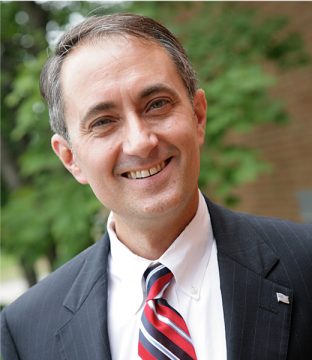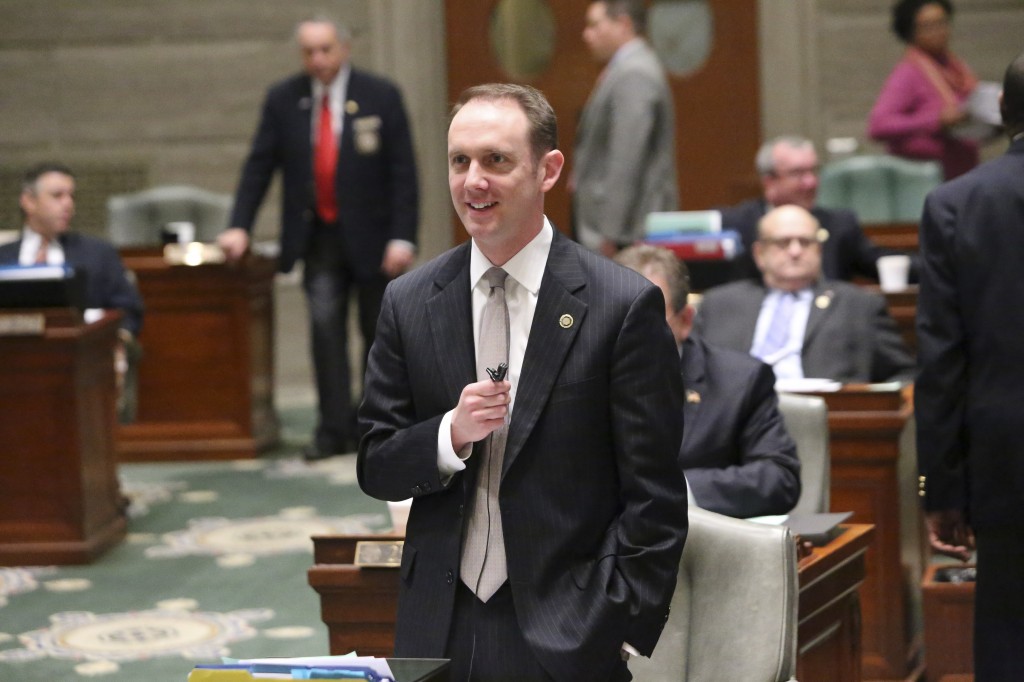ST. LOUIS – Sen. Scott Sifton has made a name for himself as one of the intellectual faces of the Democratic Party in Jefferson City. After a nine-year stint on the Affton School Board, and one lost bid for a House seat in 2002, Sifton made his way into the House in 2010. After just one term, he sought a state Senate seat and narrowly defeated incumbent Republican Jim Lembke to represent the 1st Senate District comprised mainly of South St. Louis County. In the last four years, Sifton has been on the front lines for the minority caucus and for his district as a tactful negotiator and advocate.
“I’ve worked across the aisle, I haven’t always agreed with the majority, but I think for the most part we’ve made sure the process of the Missouri Senate has been fair, there are have been strong and reasonable checks and balances in the system, and I think that’s important.”
Now, Sifton faces a sizable threat to his own incumbency as he tries to get a second term in the Senate.
Dr. Randy Jotte is an intellectual match for Sifton who believes his time at Barnes-Jewish Hospital has given him a unique perspective on multiple challenges around South St. Louis County.
“I really think that bringing in citizen knowledge and experiences is the way to make our government much more efficient and work properly for what the will of the people is,” Jotte said.
Together, let’s end partisan politics and focus on growing our economy and healing our community. pic.twitter.com/qLCQhfZCMj
— Randy Jotte (@randyjotte) September 14, 2016
Jotte has an eye-popping resume which includes accolades and experiences He graduated from Harvard Medical School, earned a Fulbright Scholarship to study at Oxford, did his residencies at Georgetown and George Washington Universities, and has served as a medical professor at Washington University, all on top of a 25-year career as an emergency room physician. He’s also a native St. Louisan and he has lived in Webster Groves for 15 years.
If Democrats believe they have the best chance for a flip in changing Sen. Kurt Schaefer’s Columbia seat blue, Republicans seem just as confident that Jotte has an equal chance of turning Sifton’s seat red.
Dr. Jotte

Jotte says that his experiences in the health care sector give him a unique perspective on programs like Medicaid. Health care also repeatedly comes up when he knocks on doors in his district. Jotte also seems to have a more openly nuanced view than many Senate Republicans on Medicaid and whether or not to expand the service. He does not advocate for expansion now, citing that the current problems with Medicaid are inherent in its current design.
“The costs are on a trajectory and we can’t sustain it, period,” he said.
But he does believe he has ways to fix the problem. Jotte said that one of the problems with the system are the patients he knows at Barnes-Jewish on a first name basis, known as super-utilizers who repeatedly use Medicaid’s services because they have chronic diseases, behavioral health issues, or addiction illnesses. Oftentimes, Jotte says those patients exist in a poorly coordinated system where no centralized figure really directs their care, thus causing more unnecessary and risky treatments than they may actually require to solve their problems.
He estimates that of the $9 billion budget for Medicaid, $3 billion is used on just one percent of the Medicaid population. Expanding Medicaid won’t relieve that problem, Jotte argues, but better management will.
“For a small group of people, by really assisting them, coordinating their care, making sure get the right care at the right place at the right time there are immense savings particularly in the Medicaid program,” Jotte said.
Jotte said he would like to invest those savings in roads and bridges or fully funding the foundation formula.
Sifton, on the other hand, often advocates for expanding Medicaid.
“While I appreciate my opponent has intimate knowledge of the industry, at the end of the day, we as a state have missed and continue to miss out on the opportunity to make our health care work for everybody by failing to expand Medicaid,” Sifton said.
But Jotte says that trepidation and a lack of results on the issue during Sifton’s time in office proves a new approach is needed.
“My sense is from meeting people, there’s deep dissatisfaction with the track we’re on,” Jotte said. “Scott has been there six years, I guess if someone’s satisfied with where we’re at and some of the stalemates we have in Jefferson City, then continue on the path we’re on.”
Sifton as operator

Despite his position in the minority caucus, Sifton can still list off a track record of accomplishments that he has achieved within the Republican-held Senate. A Safe Sleep bill attached as an amendment to combat Sudden Infant Death Syndrome in daycares, modernizing child support enforcement, four separate bills on dyslexia-related services.
Those issues may not be the big name legislative issues that get a lot of press, but he related those bills in terms that showed the people affected by their passage: a seven-month-old child that died at a daycare facility just outside his district or a mother who feared her son would struggle in school because of dyslexia.
But he has found himself at the center of many large issues as well, especially in the last year. He led the Democratic filibuster against the collateral source rule bill in the Senate, and he also played a major role in filibustering SJR 39, the religious liberties bill that many on the social left condemned as discrimination to the LGBT community.
“There are some issues where it’s easier to reach a consensus on than others, there are some where it’s easier to reach a compromise than others, and there are some where you’re not going to get a consensus or compromise,” he said.
During those filibusters, he always attempted to adhere the Senate to its own rules, something he sees as sacrosanct to maintaining the Senate’s integrity.
Beyond that, Sifton believes he can better represent the district than Jotte, who he says may become just “one more vote” in a Republican supermajority and not have much priority when it comes to turning legislation into statute. He also argues that his district, which is more moderate and evenly split than many others in the state, would appreciate a voice that ensures the state’s laws do not become too conservative on issues like gun control and labor policy.
“The question in Missouri government isn’t whether our government is going to be right of center, the question is going to be how far right of center,” Sifton said. “I believe my constituency in the aggregate is more moderate… on gun policy, labor policy, economic policy and education policy.”
Sifton added that his district is one of a few in the Senate that may determine whether or not Right-to-Work becomes law in Missouri. He opposes it because it leads to lower wages, not only for union workers, but all workers. Jotte, however, says his voluntary dues organization, the Missouri chapter of the American College of Emergency Physicians functions much like a union but one that forces its leaders to listen to their members due to its voluntary nature.
“Unions will thrive with [Right-to-Work], but they’ll have to become more responsive to their membership,” Jotte said. “We reach out to membership with surveys, we handle reimbursement issues and continuing education and training… Those unions that do act in that same regard may have to adjust, but they will be just fine.”
Legislative race of the year?
While many point to the Senate race between Rep. Stephen Webber and Rep. Caleb Rowden as the General Assembly race to watch this year, the only race that may supersede it is the contest between Sifton and Jotte.
Sifton pondered and played with the idea of running for attorney general, a move which would have continued his relatively fast rise through the ranks of Missouri politics, but he opted to run for re-election in his Senate district instead. The woman he endorsed, former Cass County prosecutor Teresa Hensley, won the Democratic primary for the statewide seat. While she is locked in a tight battle with constitutional lawyer Joshua Hawley, Sifton now also finds himself fighting against an “outsider” candidate (Jotte served on the Webster Groves City Council from 2004 to 2008).
Jotte’s candidacy seems to signal the Republican Party’s tendency to seek answers for leadership in Jefferson City from outside candidates. Gubernatorial candidate Eric Greitens perhaps most fits this mold, as does Hawley, but fellow Senate nominee Bill Eigel of St. Charles also exemplifies that ideal.
Jotte also has to overcome the incumbent, and that advantage may be enough for Sifton. In early September, The Missouri Times found that Sifton had a lead of 43-36, but Jotte has enough undecided voters, 21 percent of the district, to chip away at that deficit.
Both also have support from groups typically aligned with each of their parties. Sifton has endorsements from the Sierra Club, Planned Parenthood, the AFL-CIO, the Missouri Fraternal Order of Police and PROMO, while Jotte has endorsements from the Missouri Chamber of Commerce, Missouri Right to Life and the Missouri Cattleman’s and Corn Growers Associations
While the race’s outcome could determine some of the most impactful state policy, it could also be one of the most exciting elections for policy wonks to keep an eye on given the intellect the two men possess.











